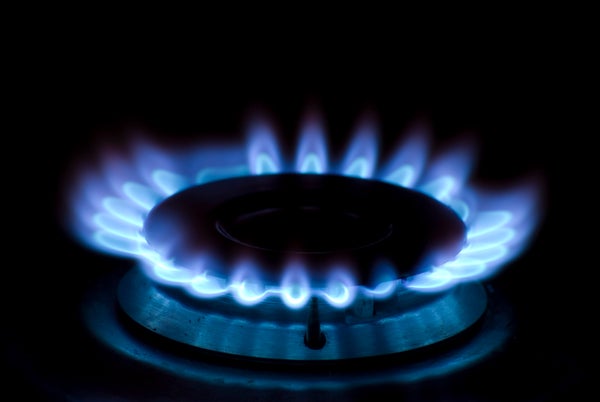CLIMATEWIRE | Gas stoves pollute homes with benzene, emitting more of the known carcinogen than present in secondhand smoke, according to a new study.
The study — recently published in Environmental Science & Technology — is the first to examine benzene levels inside homes with gas stoves. It comes as battles grow over state and local efforts to phase out the appliances.
Researchers sampled the air of California and Colorado homes with gas ovens and cooktops, comparing it to the air in homes with electric ones. Gas-burning appliances emitted 10 to 25 times the benzene of electric stoves, the analysis said.
On supporting science journalism
If you're enjoying this article, consider supporting our award-winning journalism by subscribing. By purchasing a subscription you are helping to ensure the future of impactful stories about the discoveries and ideas shaping our world today.
"We would never willingly stand over the tailpipe of a car, breathing its pollution," Rob Jackson, a Stanford University professor of Earth system science, said during a virtual meeting Tuesday with reporters. "But we do willingly stand over our stoves, breathing the pollution they emit."
In California, regulators are weighing whether to phase out gas stoves, as well as gas-fueled space and water heaters in homes. Several cities in the state have already banned installing gas appliances in new homes in the future, or offered incentives for developers to pick electric appliances instead.
However, a federal appeals court in April overturned Berkeley's gas ban for new buildings, the nation’s first such measure. Some legal scholars have said that the 9th U.S. Circuit Court of Appeals decision might chill action from states and cities considering similar bans.
The issue has stoked political tensions at the national level. The GOP-controlled House passed two bills last week to block federal agencies from regulating gas stoves. One of the bills would block a Department of Energy proposal that would eliminate half the gas stove models on the market. The other — which gained the support of 29 Democrats — aims to bar the Consumer Product Safety Commission from banning gas stoves.
Neither is likely to pass the Democratic-controlled Senate. The Biden administration also released a statement opposing the latter legislation, arguing that the bill "would undermine science-based Consumer Product Safety Commission decision-making and block common sense efforts to help Americans cut their energy bills."
During Tuesday's press conference on the Stanford study, researchers emphasized the health risks of benzene.
Scientists have known for 100 years that high doses of benzene, like those present among some oil and gas industry workers, can cause cancer, said Dr. Jan Kirsch, a retired oncologist. Metabolites of benzene accumulate in bone marrow and change genes and chromosomes, she said.
However, "there's growing information that even the lower doses, not like those encountered in industry … will also cause these toxic effects," she said.
The study found that benzene emitted from gas stoves migrated throughout homes, in some cases elevating levels of the carcinogen in bedrooms hours after the stove was turned off.
The benzene concentrations measured in kitchens after stove use also frequently exceeded peak levels reported to EPA at the fence lines of oil refineries in California and Colorado, said Yannai Kashtan, lead author of the study.
And the vents commonly installed in microwave ovens above gas burners essentially just circulate the benzene emissions, Jackson said. An external vent hood can decrease benzene concentrations, "but it doesn't necessarily bring them down below health benchmarks," he said.
Kirsch acknowledged that the study might worry those who have been cooking with gas stoves for years, especially parents.
"The idea is not obviously to cause panic," she said. "The idea is, where there are risks … we want to reduce them."
Replacing a gas stove with a zero-emissions induction one is a good choice, Jackson said. Less expensive options include a countertop induction cooktop, a slow cooker or an electric toaster oven. When using a gas appliance, he said, opening windows is important.
High Tide Foundation, which focuses on combating climate change, helped fund the research.
This story also appears in Energywire.
Reprinted from E&E News with permission from POLITICO, LLC. Copyright 2023. E&E News provides essential news for energy and environment professionals.
